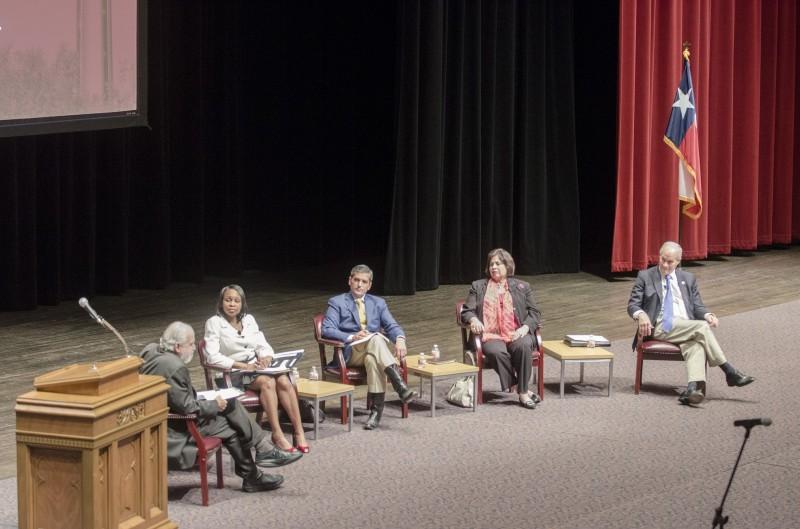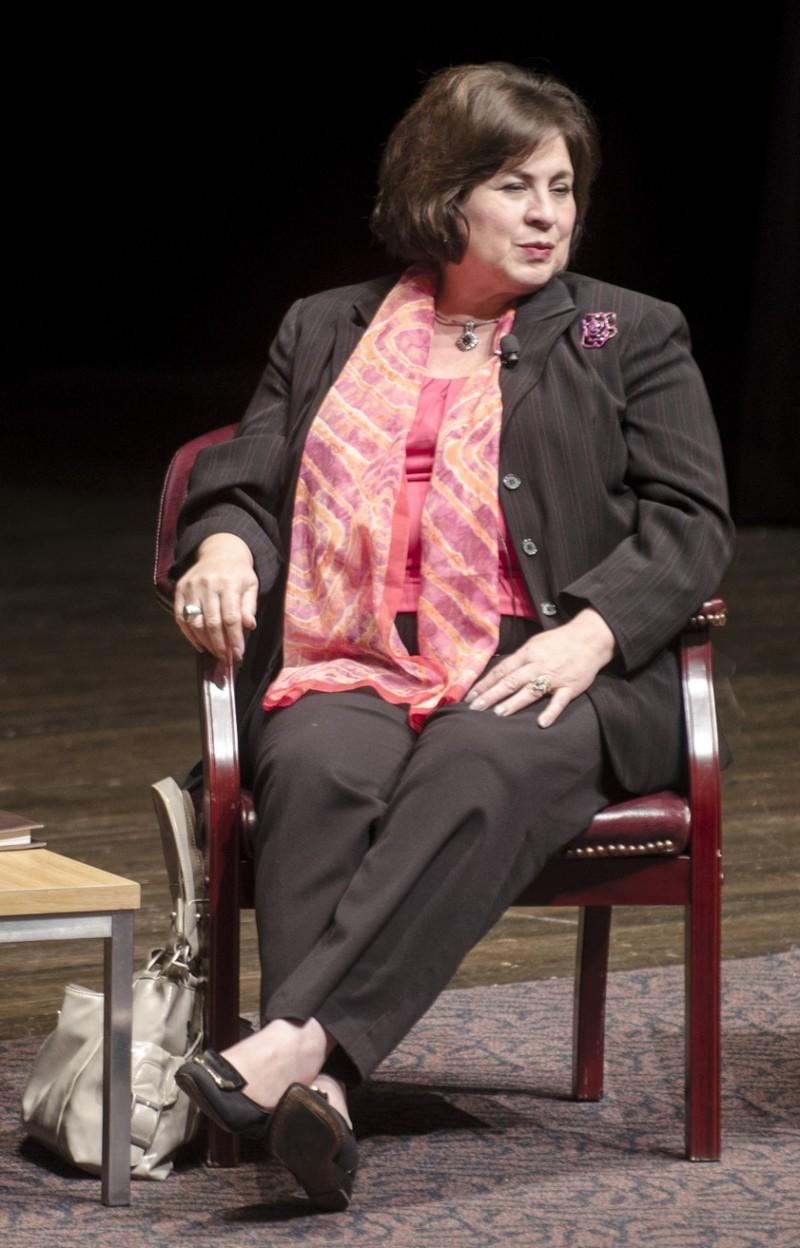On Tuesday, April 7, Trinity hosted a mayoral forum and debate between four candidates, Tommy Adkisson, Mike Villarreal, Leticia Van de Putte and current mayor Ivy Taylor. The event was moderated by Rick Casey of KRLN and was hosted by Trinity University, Trinity Progressives, Pi Sigma Alpha, Young Red and Bexar County Tejano Democrats.
The event consisted of questions from Casey, as well as questions submitted by students from several local private universities through social media, including Our Lady of the Lake, the University of St. Mary’s and the University of Incarnate Word. There were also questions presented by Trinity students.
Casey started by asking the candidates about their general goals and vision for the office.
Taylor opened, exploring her successes and goals as mayor.
“My hope is that people can get excited about the candidates and the forum can help [their] choice,’ Nishikawa said.
Nishikawa described the event as predominantly student led.
Discussion of the event began in February, when the political science department contacted student organizations about organizing the debate and forum.
“[My goal] is planning for our future so we can be strategic about the investments we have as a city and so we have a collective vision for how we want our city to grow and evolve,” Taylor said. “I think at the core of that is going to be a strong economy so that is also something I have focused on, to ensure that everyone can participate.”
Taylor elaborated on this notion, stating the divided society of San Antonio and the wealth gap, offering solutions like mixed income neighborhoods.
“We know there are many San Antonians that don’t have the time or skills to take advantage of the jobs that are being developed here. We have to have an understanding of how and where we are growing as a city,” Taylor said. “[Mixed income] is going to vary depending on the different sides of town, depending on what the situation and deficits are, especially in the inner city.”
Villarreal noted the importance of infrastructure and a strong economy, alongside improving the workforce.
“We need to be a city that is strategic and nimble, not only in organizing our public capital, but also private capital, to invest in infrastructure,” Villarreal said. “On the economic front””improving the quality of our workforce””that is an area of concern shared through every city””north, south, east or west.”
Villarreal continued, noting the flexibility and dynamic nature of the position of mayor, and his goal to help provide and create jobs.
“There is also a common belief that the mayor of San Antonio is the leader of the city, yet the mayor has no real authority over education,” Villarreal said. “That means as mayor I just need to be more creative in my role, not as the spearhead, but as a supporter and collaborator, bringing our biggest employers with our educators to do things like help transform high school education so that our measure of success is: our students graduate with choices. They can choose to enter the workforce, and take on a job at Rackspace earning $60″”70 thousand or to continue their education into a four-year institution.”
Villarreal also stressed more concrete steps, including his plan to create opportunities for students.
“They are all going to have jobs and if we are successful they will have careers, where they can continue to be lifelong students and are rewarded for their intellectual capacity,” Villarreal said. “Creating internships, apprenticeships, summer jobs. By the end of my tenure I want to create more than 20,000 [paid] internships and apprenticeships.”
While Van de Putte noted similar goals, she focused primarily on infrastructure.
“[My goal is] infrastructure, in two ways. Infrastructure with what your city is supposed to do””streets, sidewalks, drainage””its not the things that are really sexy,” Van de Putte said. “But unless you take care of your core you don’t get the things like economic growth and development and you don’t get that cohesiveness in transportation.”
Van de Putte went on to explore the second facet of her primary goals, the issue of social capital and human infrastructure.
“The second infrastructure is human infrastructure. Local communities need the tools to invest in the human infrastructure,” Van de Putte said. “As mayor I think that is just as important as the first””I think we really need to continue to make sure we are collaborating with our employers, it’s all about the workforce.”
While sharing sentiments expressed by the other candidates, Adkisson noted the simplicity of the job, and the importance of returning to the basics.
“It’s so easy to talk about what other candidates have said””whether it’s higher education or public education””and those are things I would gladly partner with or catalyze to enhance our community but quite frankly our job is basic stuff, crime-free, safe and sustainable neighborhoods,” Adkisson said.
Adkisson also noted the continuing deterioration of many San Antonio neighborhoods, something he sees as vitally important to fix.
“I’ve watched neighborhoods teetering on the edge of making it or not, with very little catalytic work. Even the people living there are thinking, “˜I wonder where our neighborhood is going,’ its like a landslide,” Adkisson said. “I’ve watched it to the point of ad nauseum.”
After addressing their primary goals and visions, Adkisson went on to criticize the current city manager, Sheryl Sculley, for her compensation.
“I think the city manager is way out of line with her compensation, and I’m the only candidate up here who has said that. I just think it’s outrageous that she makes more than the President. How did that happen?” Adkisson said.
The other candidates were more supportive of Sculley however, with Taylor noting the context of her job.
“I wouldn’t say she is overpaid,” Taylor said. “[Put] it in the context of a business that has thousands of employees and a $2 billion budget.”
Similarly, Van de Putte noted the great performance Sculley has had, although she had concerns of transparency.
“I think Sheryl Sculley has done a great job,” Van de Putte said. “She is one of the highest paid in the country in that respect, but what I am most concerned about is transparency””the transparency that occurs at City Hall, that occurs at council.”
Villarreal echoed this sentiment, criticizing the transparency in the budget process of the city.
“Transparency is an issue in our budget process,” Villarreal said. “As your highest-elected official, I will make sure city government is open for you.”
Moving from the issue of the city manager, Casey addressed the issue of the Oakland Raiders moving to San Antonio, and the future of a possible NFL team in the city. The candidates had mixed feelings on the issue, but were in agreement that other priorities came first.
“Great American cities have great universities, great park spaces, a vibrant downtown, and have transportation systems that interconnect,” Van de Putte said. “They have great social amenities, like concerts and lectures and music. And yes, sports.”
Following the questions proposed by Casey, various Trinity students put forth questions to the candidates, which included issues of land annexation and retaining students. Another question, put forth by junior Nick Allman, revolved around Uber and Lyft, which, following city legislation, left the city, and what the candidates would do to bring the companies back.
Taylor, who is currently mayor, dealt with the issue when it arose, noting how the companies failed to comply with the cities guidelines.
“I’ve said from the beginning that I welcome the transportation network companies to San Antonio, working hard to create a dialogue with us,” Taylor said. “They have not been forced out of San Antonio; they have chosen to leave. They chose not to operate in the very sensible framework we provided.”
The other candidates were supportive of bringing back the companies, with Van de Putte noting the restrictive nature of the legislation.
“I understand the public safety issue””that we need to make sure we know who is driving those vehicles””that is the public safety part, but it was really restrictive and to me, really embarrassing,” Van de Putte said. “I would start from scratch, but we really need to look at other cities and what they did. We can do this.”
Villarreal was also in support, noting the failure of Taylor in her choices around the issue, notably in heavily involving the taxi industry.
“I’ll form the voting block needed to bring them back, and I’ll take the ordinance of any Texas city that has figured this out. We don’t need to be pioneers in new regulations that push new technologies out of town,” Villarreal said. “Here is where we went wrong with the current city council; on this issue [Taylor] did get it wrong. As mayor I would not hand over responsibility on these regulation issues to someone who receives thousands of dollars from the taxi industry. I would not have allowed the taxi industry to have had such a large say in this issue.”
The election for the next mayor will take place on May 9.








